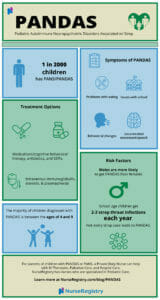If your loved one has PANDAS or PANS, you may find the information in this article to be valuable.
You will learn how PANDAS and PANS is diagnosed, hallmarks of the disease, available treatment options, and how private duty nursing can help.
Click on any of the links below to jump to a particular section that you want to learn more about.
- What is PANDAS?
- Are there risk factors for PANDAS?
- What are the symptoms?
- How is PANDAS diagnosed?
- Are there treatment options?
- How can NurseRegistry help if your child is diagnosed with PANDAS?
- What should you do if you think your child has PANS or PANDAS?
- What resources are available?

What is PANDAS Disorder?
IN THIS ARTICLE
PANDAS is a medical term short for Pediatric Autoimmune Neuropsychiatric Disorders Associated with Streptococcal Infections. Essentially, it is an autoimmune disorder.
PANDAS is a subset of Pediatric Acute-onset Neuropsychiatric Syndrome, or PANS. Children with PANS experience a dramatic development of obsessive-compulsive disorder (OCD) and/or an eating disorder, almost overnight.
PANS has no known trigger, but children with PANDAS test positive for a known trigger, such as perianal strep or scarlet fever.
Are there risk factors for PANDAS?
Currently, doctors believe that children who develop PANS and PANDAS have a genetic predisposition.
These conditions are then triggered by environmental events. Although the trigger for PANS is unknown, doctors are aware that PANDAS is an autoimmune response caused by a streptococcal infection.
Strep infections, such as perianal strep, strep throat, or scarlet fever, can trigger PANDAS. Here are some of the known risk factors:
- Any infection caused by group A streptococcal
- A family history of rheumatic fever
- Mother’s history of having an autoimmune disease
- Age
- Children who are prepubescent are at greater risk for PANDAS
- Sex
- Males are more likely to get PANDAS than females are
PANS and PANDAS are not contagious. Instead, you’re looking for neuropsychiatric symptoms.
However, the infections that trigger PANDAS can be. If your child has been in contact with someone with a strep infection, it can take two to five days for symptoms to show. Contact your pediatrician to get throat cultures and a rapid strep test if you think your child has strep.
What are the symptoms of PANDAS Disorder?
PANDAS results in an acute onset of OCD and/or tics in a child—typically within two to three days. Children with a clinical diagnosis of PANS or PANDAS may be moody, irritable, and anxious.
They may experience uncontrollable emotions and have difficulty with schoolwork, resulting in poor academic performance.
First, let’s examine what types of strep infection can trigger PANDAS. Any infection caused by group A streptococcal can trigger PANDAS.
- Strep throat
- Cellulitis
- Scarlet fever
- Perianal strep
Strep bacteria trigger an autoimmune response because they hide from the immune system by mimicking host cells. The immune system recognizes the foreign cells and creates antibodies to attack them.
Unfortunately, some of the host’s cells may be affected in the cross-fire. This results in PANDAS symptoms.
This does not mean that strep throat will always result in PANDAS. On average, school age children get two to three strep throat infections each year.
Here is a full list of symptoms that your child may experience if they have PANDAS:
- Obsessive-compulsive disorder (OCD)
- Eating disorder (ED)
- Attention Deficit Hyperactivity Disorder (ADHD)
- Tics (involuntary, purposeless movements), such as Tourette’s syndrome
- This can include motor and/or vocal tics
- Uncontrollable emotions
- Moodiness
- Irritability
- Anxiety (including anxiety attacks and separation anxiety when leaving parents or loved ones)
- Depression
- Sleep disturbances
- Changes in urinary frequency, or bedwetting
- Poor academic performance
- Deterioration in handwriting skills
- Joint pain
Children with PANDAS will experience a sudden onset and a slow, gradual improvement. Symptoms may last a few weeks to a few months or longer, depending on how well the child responds to treatments and the recurrence of strep infections.
How is PANDAS diagnosed?
There has not been a large population study on the incidence of PANDAS, so we don’t know how common it is. A conservative estimate finds that 1 in 2,000 children has PANDAS/PANS.
Doctors often overlook PANDAS because of the assumption that there is no underlying medical cause for the patient’s symptoms. Therefore, it can be difficult to diagnose.
PANDAS is diagnosed based on an individual’s medical history and a physical examination. The following criteria is helpful in providing a clinical diagnosis of PANDAS.
- Association with group A streptococcal infection, proven by a positive throat culture for strep throat or a history of scarlet fever. That does not mean every sore throat is a symptom, however.
- Presence of OCD and/or a tic disorder.
- Episodic course of symptom severity, meaning a dramatic change in the severity of symptoms (see symptoms – add link).
- Very abrupt onset or worsening of symptoms.
- Association with neurological abnormalities (hyperactivity or uncontrollable physical movements).
- Pediatric onset of symptoms (ages 3 to puberty).
In addition, there must be multiple tests for antibodies to detect an increase in levels. The test is usually done 4 to 6 weeks apart to determine if there is a rise in levels. Additional testing may be done to rule out any other possible diagnosis.
In fact, it can be difficult to differentiate between PANDAS, OCD, Tourette’s syndrome, or Sydenham chorea.
Based on PANDAS Network research, the majority of children diagnosed with PANDAS/PANS is between the ages of 4 and 9.
Are there treatment options?

Yes, there are treatment options for PANDAS.
A child should see their pediatrician at the first onset of symptoms. Specialized management may require a referral to a PANDAS physician, psychiatrist, or other mental health professional.
The primary treatment methods are medications and cognitive behavioral therapy. Doctors will first want to treat the strep infection with antibiotics. They will also take measures to control OCD symptoms with selective serotonin reuptake inhibitor (SSRI) medications.
In severe cases, intravenous immunoglobulin, steroids, and plasmapheresis can be useful treatment options. Of the three, steroids can be the least effective option, as symptoms may come back if treatment is stopped.
After several months, a child with PANDAS may still negatively react to viruses, bacteria, and even chemical compounds like chlorinated pools.
Children may continue to have minor episodes even after they are done with their antibiotic treatment. These episodes may be due to the aforementioned environmental triggers, though researchers are still unsure.
The prognosis can be very good for a child who has been diagnosed early and if the cause has been identified. Some patients respond well to treatment and can return to 100 percent normal function.
However, this does not happen for everybody. If the cause is unknown, or if the patient doesn’t respond well to antibiotics, the patient and family will have to work with their medical team to address the illnesses.
For some children, every strep infection can result in a worsening of symptoms. There is some evidence that prophylactic antibiotics can reduce the risk of recurring strep infections, therefore reducing the risk of worsening symptoms.
Most importantly, if PANDAS is left untreated, it can increase the risk of OCD and tics lasting through adulthood.
To date, PANDAS is the only subset of PANS. This disorder was described fairly recently in the 1990s.
How can NurseRegistry help if your child is diagnosed with PANDAS?
Is there a PANDAS Disease treatment?
For children who have been diagnosed with Pediatric Autoimmune Neuropsychiatric Disorders (PANDAS) or those seeking ongoing treatment for Pediatric Acute-onset Neuropsychiatric Syndrome (PANS), a private duty nurse can help with IV therapies.
For parents of children with PANDAS or PANS, NurseRegistry can also help with Palliative Care and Respite Care. NurseRegistry has nurses who are specialized in Pediatric Care. If you would like to learn more about how an experienced nurse can help with PANDAS or PANS, please call 650-462-1001 to speak with one of our Client Care Coordinators.
What should you do if you think your child has PANS or PANDAS?
If you notice a substantial behavior change with your child, or if you know your child has been in contact with someone with strep throat, you should consult your child’s pediatrician.
In severe cases, it may be best to go to the emergency room. Do not try to diagnose your child by yourself. A pediatrician will want to consider all possible explanations for any unforeseen behavioral changes in your child.
You may want to find out from your child’s school if any strep throat has gone around. Strep throat symptoms are not always visible and can be difficult to recognize at times.
NurseRegistry is a nurse staffing agency that provides RNs and LVNs to patients for care in their home.
If you’d like your child to benefit from an in-home nurse, click here to learn more about NurseRegistry today.
What resources are available?
Stanford Medicine has a PANDAS Physician Network, which has more information regarding treatment options and the Stanford PANS Program.
The Tourette Syndrome Association has a large amount of information and resources for parents of children with Tic symptoms.
Stanford Children’s Health is an excellent resource for individuals seeking more information about PANS and PANDAS.
The PANDAS Network has information on support groups and an online newsletter you can subscribe to for up-to-date information on PANDAS research.
Childmind.org offers a parents guide to PANS and PANDAS.
The National Eating Disorders Association has information about issues with eating and offers help and support to families.
The International OCD Foundation provides more resources, information, and support for families with a child that has OCD.
Disclaimer: The information provided in this article is not intended to diagnose health problems or take the place of professional medical advice or care you receive from a health care provider. A PANDAS diagnosis must be confirmed with a licensed medical professional. Always consult your health care provider about symptoms, health problems, medications, and treatments.





